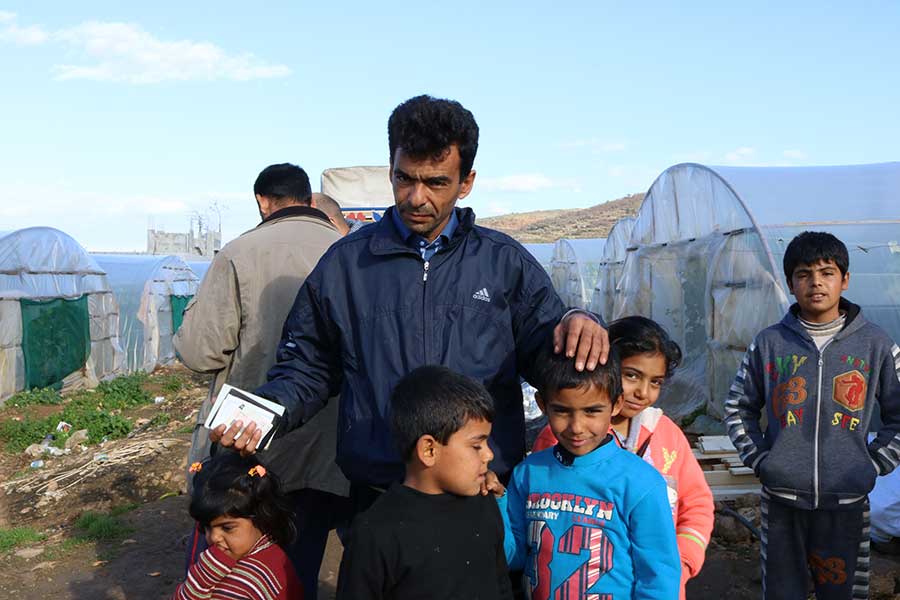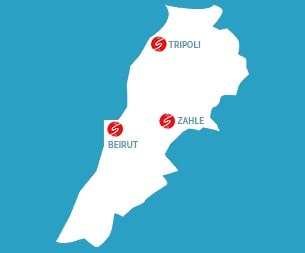In northern Syria, the Idlib region has been targeted by incessant bombings since the end of December. After a month under the bombs, 200 families from Jarjanaz had to flee their village, reduced to rubble. Marwa and Hassan tell the story of their family.
I was heading back from the ‘Souk’ with my two sons. As soon as I arrived, the helicopters started bombing the village. It was the last time I saw my house, and the last time I went inside the village .” Hassan.
The shelling started without warning, explained Hassan, and most of the families escaped the village with nothing but their clothes on their backs. For the next ten days, they stayed on the outskirts of the village. In the fields some families built makeshift tents, others sought refuge in underground shelters they had dug many months ago. “Just in case”. Many families slept in the open at the mercy of the freezing cold weather. They had nothing to eat or drink for several days.
Returning to the village when the air raids stopped was impossible, because of undetonated cluster bombs and roving planes that would target the fields surrounding the villages as well as anything that moved. Men snuck in the middle of the night to the closest villages that had not yet been struck, dozens of kilometers away to try to buy food or get it as charity.
“We tried as much as possible to stay near our village but it was unbearable anymore. We had to leave” said Hassan.
WHERE ELSE TO GO ?
In Syria, we have two options. Either we go into government-held areas and then risk our husbands and boys being forced to serve in the army, or we go into rebel-held areas and risk being bombed again sooner or later.” Marwa, mother of five daughters.
Hassan could initially send his wife to a village near the Syro-Turkish border, while he rented a house in a village 100 kilometres from Jarjanaz.
“When they know you’re displaced, the rent goes up. I was paying 100 dollars, my relatives were paying 200, some 250. Landlords are even starting to ask for advance payments”. Hassan explained that with no work opportunities and the high cost of living, on top of a constant risk of new villages being targeted by air strikes, families who saved some money would soon be left with few options: go bankrupt, engage in illegal activity, take part in the war, or use whatever money they had left to leave the country. Those who didn’t have money are now sleeping in the streets and begging for food.
THE TRIP TO LEBANON
It took Marwa 3 days by car to reach the Lebanese border. She had to pass through countless army checkpoints. Without hiring a smuggler, she says it would have been impossible to make it alive. The smuggler asked for 1,000 dollars at first but she ended up paying 2,000. In the middle of the road at the mercy of an armed smuggler, negotiation is not an option. “My 2-year-old boy was crying loudly. The smuggler put a gun against his head and threatened to shoot him if he didn’t stop. I couldn’t do anything but beg. It was the most difficult moment of my entire life” – Marwa
Hassan, Marwa, and those who could afford to escape Syria to Lebanon are now hosted temporarily in their relatives’ and acquaintances’ shelters. For now, they live of whatever charity their neighbors can provide them and of assistance brought by NGOs.
At least my kids are safe. This is all I care about now. Everything else is bearable.” Hassan
Lebanon
Context and action- 5.6 million inhabitants
- 112th out of 191 countries on the Human Development Index
- 122.148 people helped

To alleviate the suffering of those who manage to seek refuge in Lebanon, SOLIDARITÉS INTERNATIONAL works alongside their host communities to improve the lives of the most vulnerable by making their housing secure and providing them with access to drinking water. Our teams are restoring and building water and sanitation infrastructures, and installing water distribution networks. Moreover, to minimize the risk of a health crisis, our teams are conducting awareness-raising campaigns.
Refugees and host communities work together, helping to reinforce social cohesion. To relieve the pressure on water and food resources, SOLIDARITÉS INTERNATIONAL also runs training programs focusing on new farming techniques, particularly urban agriculture.
Finally, SOLIDARITÉS INTERNATIONAL teams distribute cash, to give people the freedom to choose how they spend their money. This helps families to take control of their lives and enjoy a more dignified standard of living.

